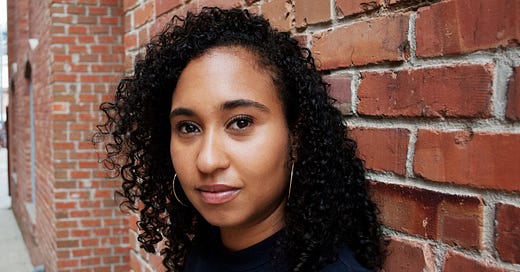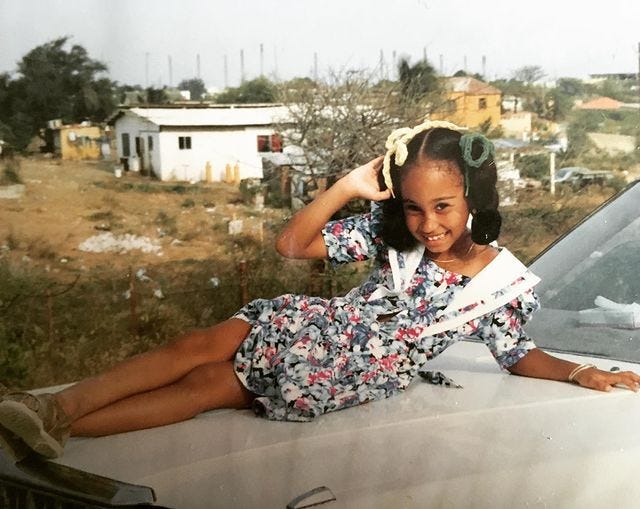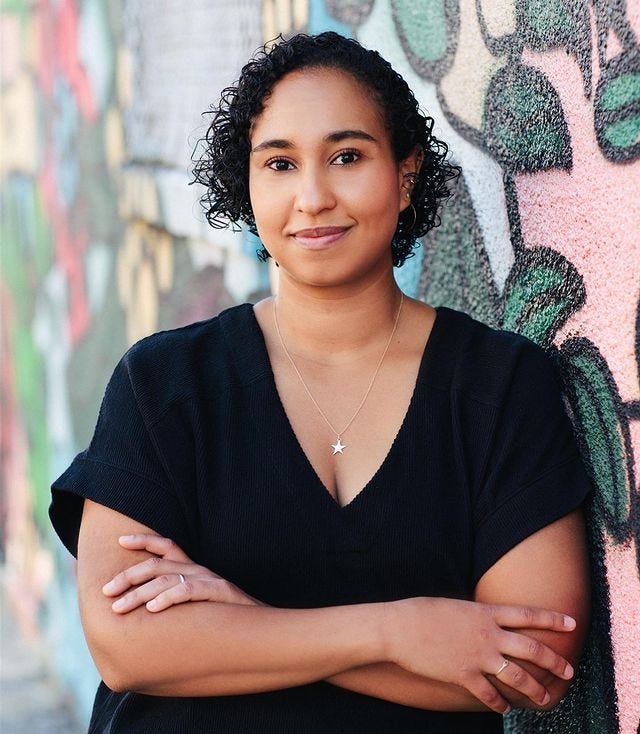Naima Coster: “I want to disentangle the conversation from looks”
The author on finding her space, raising a mixed family and Christina Aguilera
Hi, welcome back to Mixed Messages! This week I’m speaking to Naima Coster, who is of Black and Latin American heritage. Naima is the author of Halsey Street and What’s Mine And Yours, a stunning novel that explores the way people can see race in convenient, complicated ways. Naima spoke so beautifully about being mixed, motherhood and how the conversation needs to shift that this week’s newsletter is a bumper one – I hope you enjoy!
How do you define your ethnicity?
I think about myself as a Black woman, as Latina, as Caribbean, as American, as a New Yorker, as someone who is in a mixed family… all of those terms have been tricky to claim for myself at times.
Has defining yourself been tricky because of external pressures?
In girlhood, I was told that people saw me differently than I saw myself. They’d say ‘you don’t look Black’ or ‘you’re only half-Latina, not full.’ Some of those experiences were really formative; I carry around that anxiety of being excluded from groups with which I identify.
I don’t like the term ‘half’ because it seems rooted in biological ideas of race, which I don’t want to perpetuate. Language fails to capture the complexity of the ways I identify. The stickiness of language leads me to ask questions in my work more than I make assertions, like what does it mean to be white-presenting, is it the same as being white?
How have you connected to your cultures?
For me, culture has been an experience of connection and alienation simultaneously. I feel that way about the Spanish language. There’s yearning there, but I’m also trying to carve out something new. I connect to culture through narrative or memory, the preservation of stories and ideas across generations. I don’t want my daughter to feel shame about her familial legacy.
I’m resistant to nostalgia that can flatten the range of things that it can mean to be from a place or a culture. These days in the Dominican Republic, there are people less interested in typical Dominican than a pizza, or are listening to Metallica.
I ask myself what it means to be first, second or third generation, and what continue to be the points of connection as culture shifts. I’m not a preservationist – I’m more interested in new traditions.
Did you see any representation that resonated with you when you were younger?
There was such a lack of representation that I had a thirst to claim someone. I remember seeing Christina Aguilera and thinking ‘she’s Latina!’ even though there’s not much we have in common.
In writing, I found that stories by Caribbean women reflected my family experience. In particular, Breath, Eyes, Memory by Haitian American writer Edwidge Danticat is very connected to my first novel, Halsey Street. Books gave me that representation in a way that felt true, so I could find a way to not feel alone.
Is that why you wanted to write What’s Mine And Yours, to portray identity authentically?
I knew I wanted this to be a story of racial crossings, with respect to the integration in the high school, but the family dynamics that emerge happened at an unconscious level. I considered what it means for the people at the centre of the book to fall in love and form this friendship as people of colour who identify and see the world differently; what it means for sisters with a Latino father and white mother to relate to both of their parents, particularly given their mother's politics.
With Lacey May, I didn’t want to write a woman who opposes integration. I wanted to write a woman who is struggling to support her girls, whose husband is in and out of her life, and for whom the role of mother and wife are so important that she doesn't know what to do when those are compromised and the opportunities of her girls are threatened by the integration.
My book challenges the idea that who you love alone can undo long-held ideas and your attachment to your own privilege. I think it can, but I also think it cannot.
Is Lacey May written based on real-life experiences?
She is a familiar figure to me – she can do mental acrobatics and make all these justifications and arguments, regardless of the people she loves.
I come from a Caribbean family that's part of the black diaspora, yet I’ve experienced anti-Black arguments and ideas in my own family. There's a distancing and denial that happens.
How would you like the conversation around mixedness to change?
I find the conversation to be binary, between white people and people of colour. I want more conversations about the complexities, tensions and possibilities for solidarity that exist among communities of colour. I'm interested in decentering whiteness in these conversations, because there are so many different connections and directions that are worthy of examination.
Is it easy to identify as mixed in America?
I’ll speak from my experience and say that if you’re mixed-Black, you’re Black. I also think the idea of being mixed is so linked to appearance that people labelled me as mixed without any sense of my family. I think a lot about how to disentangle the conversation from just how people look, but also about heritage culture identification.
Have you made a conscious effort to connect with other mixed people?
Now that I have a child, it’s important to connect with other mixed families. Not because I think our kids are cute (they are) but because there are experiences that are important for me to share with someone who understands. Other parents can help me think through complicated questions that I don’t have the answers for, like how to support my daughter as she thinks about how she identifies. I fear that she won't be connected to me or be like her ancestors, but I don't want to limit her own authentic reckoning with who she is.
I felt pressure to identify as Black – I still do. Because there was so much anti-Blackness in the world, it was important for my parents that I didn’t internalise that. But I want to help my daughter find her own way.
What’s the best thing about being mixed for you?
I think the flip side of alienation is access. I feel on the periphery of different groups, but I'm still there – that formed me. A lot of my characters think about themselves in different ways, which speaks to all the ways I see myself.
If you could define your mixed experience in one word, what would that be?
Unsure. In the United States, we have a culture that overemphasises the importance of certainty, clear answers and authority. But I think there’s a lot of value in being tentative and questioning, and saying I don’t know.
Next week, I’ll be talking to musician Simeon Hammond Dallas. Subscribe to get Mixed Messages in your inbox on Monday!
Enjoy Mixed Messages? Support me on Ko-Fi so I can continue to grow this newsletter! My new goal is to pay a mixed writer to create a special first anniversary edition of Mixed Messages.
Mixed Messages is a weekly exploration of the mixed-race experience, from me, Isabella Silvers. My mom is Punjabi Indian (by way of East Africa) and my dad is White British, but finding my place between these two cultures hasn’t always been easy. That’s why I started Mixed Messages, where each week I’ll speak to a prominent mixed voice to delve into what it really feels like to be mixed.








